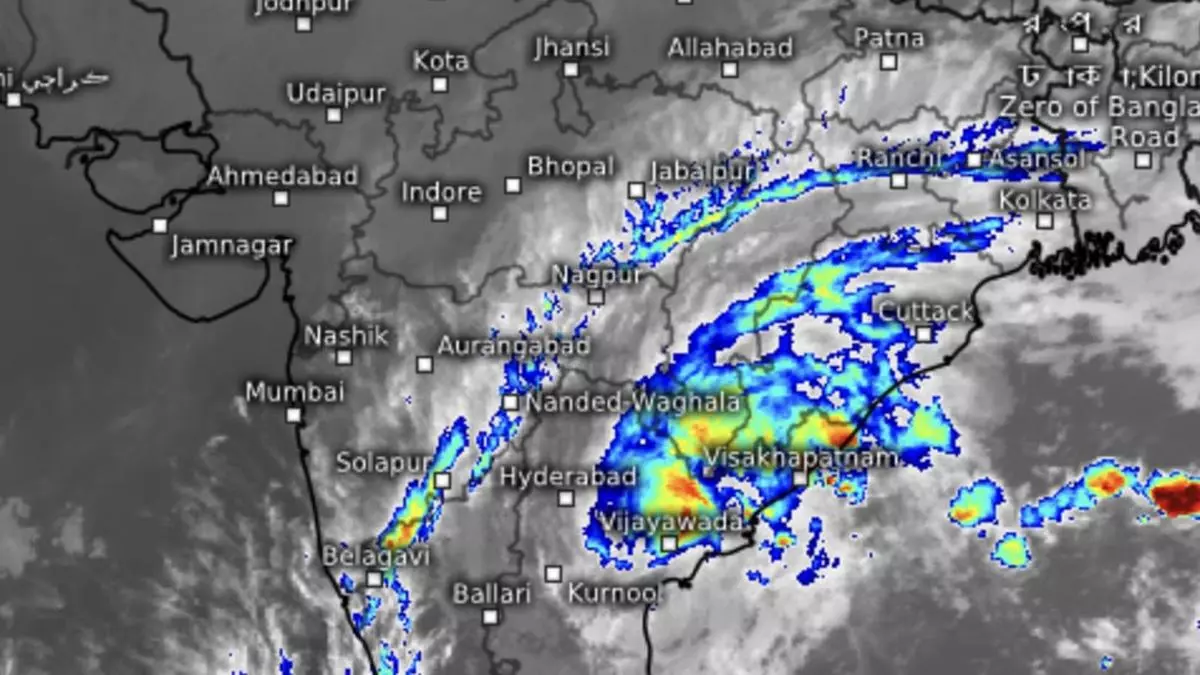Rains batter TN, South Coastal AP as ‘Michaung’ breaks up along coast
North Coastal Tamil Nadu was battered by extremely heavy to exceptionally heavy rain for a second day through Monday as an unexpectedly slow-moving severe cyclone Michaung held the State capital Chennai and neighbourhood in thrall before breaking up in an elaborate landfall along the south Andhra Pradesh coast to the south of Bapatla during the noon hours on Tuesday.
Coastal AP bears brunt
The adjoining south coastal Andhra Pradesh, too, bore the brunt as the severe cyclone represented yet another case of India Meteorological Department (IMD) tracking a powerful cyclone with pin-point accuracy, though it might have been overwhelmed by the sheer force of the heavy torrents unleashed over the past two days. This is largely because Michaung had bogged down a bit and slowed down to as low as 7-10 km/hr in lateral speed through Monday. The slow movement ensured it emptied its voluminous contents big time in the form of sustained heavy rain along these coasts.
Exceptional heavy rain
Perungudi in Chennai recorded an exceptionally heavy 45 cm of rain while Poonammallee followed with 34 cm during the 24 hours ending on Tuesday morning, the IMD said. A number of other stations recorded more than 20 cm for a second day, while those along Coastal Andhra Pradesh and Yanam and Rayalaseema did not lag far behind. The landfall unfolded slightly delayed than scheduled to the South of Bapatla to the accompaniment of winds with maximum sustained winds 90-100 km/hr, and took the next couple of hours to complete, the IMD said. An hourly update at 3.30 pm said the system had crossed land and weakened as a conventional cyclone and lay 20 km to the West-South-West of Bapatla and 45 km to the North-North-East of Onglole.
Rain outlook for next week
‘Michaung’ was expected to retain the strength of a cyclone late into the night even as it moves to the North along the coast. Outlook for the next seven days suggested fairly widespread to widespread to scattered to moderate to isolated rainfall over the meteorological subdivisions of Chhattisgarh; coastal Andhra Pradesh and Yanam; Telangana; Rayalaseema; Tamil Nadu, Puducherry and Karaikal; coastal Karnataka; north interior Karnataka; south interior Karnataka; Kerala and Mahe; and Lakshadweep. Fairly widespread to scattered rain is indicated on all these days for Andaman & Nicobar Islands, signalling the southern parts of the Bay of Bengal would continue to be moderately active after the passing of severe cyclone.
CEEM cyclone analysis
According to Vishwas Chitale, Senior Programme Lead of think-tank Council on Energy, Environment and Water (CEEW), a study that analysed the occurrence of cyclones in the last five decades had shown districts with the highest cyclone exposure were found to be concentrated along the eastern coast of India. This exposure has made governments enhance adaptive capacity and reduce the risk of life through initiatives like the National Cyclone Risk Mitigation Project (NCRMP).
“Our research indicates that 100 per cent of the population exposed to cyclones in India has access to early warning systems. However, recent studies suggest a decrease in the frequency of tropical cyclones in the Bay of Bengal in the last couple of decades, but those that do form undergo rapid intensification. This calls for urgent measures to prepare for associated extremes, such as heavy rainfall causing flash floods, as observed in Chennai , and climate-proofing critical infrastructure along the coasts,” he wrote to businessline.
Occasional rain seen
Meanwhile, a few global models predict the Tamil Nadu coast may receive the next bout of rain from December 15, which may sustain with lesser intensity into the year end, though with occasional flare-ups over the southern parts of the State. Incidentally, this is expected to triggered by easterly wave activity over the southern parts of the Bay, and could sustain into the New Year from an interaction of a passing western disturbance that digs deep into the southern latitudes with the easterlies.
